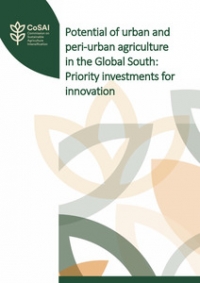In December 2019, the Cali city council approved a policy to guarantee the availability, access, consumption, quality and sustainable use of food by the population of Cali, especially the most marginalized. The policy had been proposed with the support of scientists working with the International Center for Tropical Agriculture (CIAT) and the CGIAR Research Program on Water, Land and Ecosystems (WLE).
Cali, the third-most populous city in Colombia, faces a double nutritional burden. On one hand, it suffers high rates of child malnutrition and, on the other, the highest rates of overweight and obesity in the country. Poverty and misconceptions are part of what stands in the way of healthy diets:
"The lack of economic resources does not allow people to have a complete, quality and varied daily diet. It is known that eating vegetables is healthy, but people perceive them as expensive. That's why eating fried sausages with potatoes, which cost two thousand pesos (less than USD$1), or food from a packet, is presented as a good option, as opposed to rice with vegetables, which can cost the same," said Jenny Peña, a CIAT scientist.
What's more, Cali is the second largest producer of waste -- including food waste -- which is another indication that the food system is inefficient.
To address these shortcomings in Cali's agri-food system, CIAT scientists have since 2015 worked with the Cali Municipal Government to redesign a public policy on food and nutritional security and sovereignty, as part of the Cali Eats Better project.
The project helped create an academic platform on food and nutritional security, comprising 12 institutions representing all sectors. It is through this platform that CIAT and WLE scientists provided technical support, identified knowledge gaps and offered recommendations for the proposed, and recently approved, food security policy.
The policy, which is aligned with national, regional and global policies, including the Milan Urban Food Policy Pact -- a framework for cities seeking to achieve more sustainable food systems -- was approved in December 2019. It establishes the necessary mandate and provides a roadmap for guaranteeing availability, access, consumption, quality and sustainable use of food in the population of Cali over the next 10 years.
CIAT/WLE continues to engage with other municipalities in the region, expecting to foster similar policy developments elsewhere.









